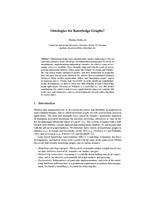Ontologies for Knowledge Graphs?
From International Center for Computational Logic
Ontologies for Knowledge Graphs?
Markus KrötzschMarkus Krötzsch
Markus Krötzsch
Ontologies for Knowledge Graphs?
In Alessandro Artale, Birte Glimm, Roman Kontchakov, eds., Proceedings of the 30th International Workshop on Description Logics (DL 2017), volume 1879 of CEUR Workshop Proceedings, July 2017. CEUR-WS.org
Ontologies for Knowledge Graphs?
In Alessandro Artale, Birte Glimm, Roman Kontchakov, eds., Proceedings of the 30th International Workshop on Description Logics (DL 2017), volume 1879 of CEUR Workshop Proceedings, July 2017. CEUR-WS.org
- KurzfassungAbstract
Abstract Modern knowledge representation (KR), and description logics (DL) in particular, promises many advantages for information management, based on an unambiguous, implementation-independent semantics for which a range of reasoning services is available. These strengths align well with the needs of an ever growing information industry. Today, giants like Google, Facebook, and Wikimedia consciously deploy ontological models, and store information in graph-like data structures that are more similar to DL ABoxes than to traditional relational databases. Many smaller organisations follow, and “knowledge graphs” appear in numerous places. Clearly, logic-based KR can make significant contributions to this development, yet there is often very little adoption in typical knowledge graph applications. Focusing on Wikidata as a particular use case, this invited contribution asks which technical issues might limit the impact of symbolic KR in this area, and summarises some recent developments towards addressing them in various logics. - Projekt:Project: Cfaed, DIAMOND, HAEC B08, Wikidata
- Forschungsgruppe:Research Group: Wissensbasierte SystemeKnowledge-Based Systems
@inproceedings{K2017,
author = {Markus Kr{\"{o}}tzsch},
title = {Ontologies for Knowledge Graphs?},
editor = {Alessandro Artale and Birte Glimm and Roman Kontchakov},
booktitle = {Proceedings of the 30th International Workshop on Description
Logics (DL 2017)},
series = {CEUR Workshop Proceedings},
volume = {1879},
publisher = {CEUR-WS.org},
year = {2017},
month = {July}
}

